Although now out of reach save for the wealthy (and those willing to embrace lifetimes of crushing debt), there was a time not so long ago that average people without even a billion dollars to their name found university attendance well within their means. Legions flocked to universities.1 Those days are gone for good, but thanks to authors who’ve incorporated campus settings into their fiction, fictional universities are but a quick purchase away.
Consider these five works set in academe…
The Compleat Werewolf by Anthony Boucher (1942)
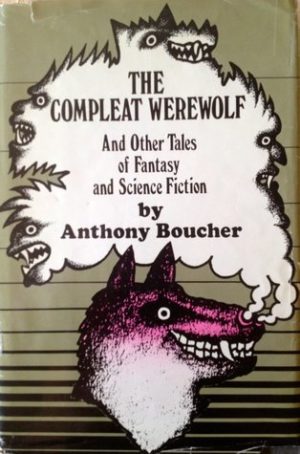
Undergrad Gloria Garton was happy to embrace Professor Wolfe Wolf’s enthusiastic mentoring. Now a movie star, Gloria Garton has better options than “Professor Woof-Woof” and no interest in taking up where the two of them left off. 2 A heartbroken Wolfe does what so many melancholy academics and scholars have done before him. He heads to the nearest bar to drown his sorrows. The consequences are unexpected.
Magician and fellow barfly Ozymandias draws the astonished Wolfe’s attention to a fact previously unknown to Wolfe: Wolfe is a werewolf; he needs only a magic word (which Ozymandias supplies) to transform into an impressive wolf. Armed with his magic word, Wolfe sets off to win the girl of his dreams. Abject failure, academic disgrace, and a well-armed Nazi spy ring await!
Readers may wonder that the book accepts day-drinking and mash notes to undergrads as perfectly acceptable professorial behaviour. Wolfe would have been fired for such things in these enlightened days. However, he does manage to get fired, tenure notwithstanding. Classroom nudity plays a role, as does, very curiously, classroom sobriety. This is a zany comedy, so readers may be assured that it all works out in the end.
Worlds by Joe Haldeman (1981)
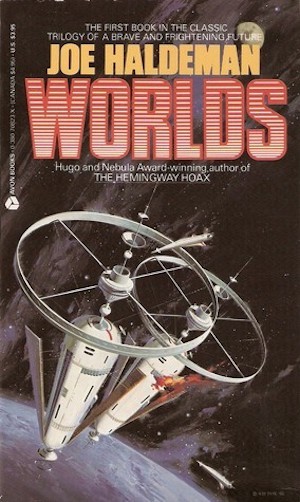
One of the half million who call the orbiting habitats (the Worlds) home, Marianne O’Hara’s academic ambitions draw her down from New New York to its namesake on Earth. A fourth-generation child of the Worlds, O’Hara looks forward to an enriching education on Earth. Pity that so much of it will be intensely unpleasant.
New York is a violent, crime-ridden city. While the Second Revolution brought an unstable peace to the United States, stark divisions remain, wanting only a spark to flare into civil war. Likewise, while the world took a lesson from the cataclysmic South American nuclear war, across the planet vast nuclear arsenals remain, awaiting only the right spark to be unleashed. O’Hara may be that spark.
Worlds is a compact exploration of late-1970s, early 1980s American enthusiasms and anxieties: space cities on the plus side of the ledger, and urban decay, political strife, and nuclear doom on the minus. There are other contemporary works3 that draw from the same well of inspiration, but Haldeman’s was one of the better written books.
Starfarers by Vonda N. McIntyre (1989)
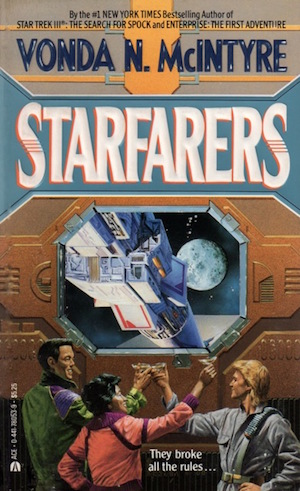
Rather than leave academia behind, the academics who staffed Starfarer convinced a consortium of nations to provide them with a space-going university. Propelled by solar sails4, the diverse and brilliant crew will hook on a passing cosmic string, leap past the gulfs of space, and begin the age of human interstellar exploration. That’s the plan.
America provided the lion’s share of Starfarer’s funding. President Distler believes this makes Starfarer American property. America has no particular need for interstellar exploration. A heavily armed orbiting battle-station, on the other, could secure American safety in a divided world. The only thing between Distler and his bold plan to repurpose Starfarer is a collection of unarmed idealists. What are they going to do, steal an entire starship?
Stealing entire starships is such a common development in science fiction5 that there are good reasons for funding agencies to invest in better locks and keep ignition keys in trustworthy pockets. Starfarers is notable for a dramatis personae unusually diverse for its era, and for having its genesis in a series of convention joke panels about the non-existent Starfarers TV show.
They Promised Me the Gun Wasn’t Loaded by James Alan Gardner (2018)
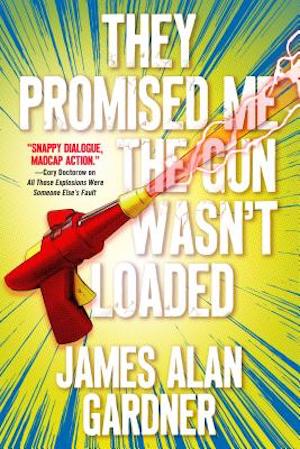
Long before the lab accident that imbued Jools and her chums with superpowers, Julietta “Jools” Walsh was prone to intense self-loathing. She is painfully conscious of her failing grades, rampant promiscuity, and borderline alcoholism. Gaining genuine superhuman abilities has only added to Jools’ list of worries. Jools is, for good reason, concerned that she may be a Mad Scientist. And that would be bad.
No fool, Jools keeps her superhero identity carefully sequestered from her Jools life. This does not prevent an ambitious Darkling6 from recruiting her in a bid to recover a gun from the very same laboratory where Jools gained her power. Nor does her superhero status protect her from the Merry Men, ostensibly heroic super-thieves who also want the gun. Caught in the crossfire, Jools could easily end up mind-wiped. Or dead. And that would be worse.
Firmly in the grand old tradition of flawed super-humans doing their best to overcome their personal foibles, Gun explores the ramifications of the rules established in Gardner’s earlier book, 2017’s All Those Explosions Were Someone Else’s Fault. Which, as anyone who has read superhero comics might suspect, are pretty disturbing. The Light that powers superheroes reshapes them to suit their role. Jules’ enhanced intellect cannot protect her from this, but it does let her appreciate the process.
Haunted Heroine by Sarah Kuhn (2020)
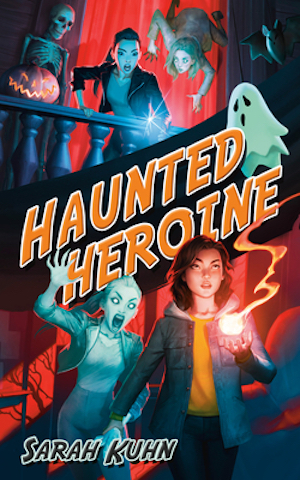
Seeking distraction from the pressures of impending motherhood, pyrokinetic superhero Evie Tanaka returns to Morgan College. Once a lowly grad student, now Evie is a consultant, posing as a teaching assistant long enough to discover why the ghosts of the notoriously haunted Morgan College have suddenly changed their ways.
Fire-wielding Evie has avoided Morgan College since some unknown person (ahem) accidentally burned down the library with powers they had yet to master. Embarrassment about power misused isn’t Evie’s only reason for avoiding Morgan: her odious ex is a Morgan College tenured professor. Evie has spent years avoiding the predatory prof. Now she gets to work alongside him.
What are the odds that two stories set on campus would feature professors given to macking on students? However, society has moved on since the era of Boucher’s story. Kuhn’s tale of old shames and personal empowerment provides an entirely different perspective on the idea.
***
Academia features prominently in many science fiction and fantasy novels. I didn’t even touch on all the magical colleges. Some of you may have your own favourites. If so, comments are, as ever, below.
In the words of fanfiction author Musty181, prolific book reviewer and perennial Darwin Award nominee James Davis Nicoll “looks like a default mii with glasses.” His work has appeared in Publishers Weekly and Romantic Times as well as on his own websites, James Nicoll Reviews (where he is assisted by editor Karen Lofstrom and web person Adrienne L. Travis) and the 2021 and 2022 Aurora Award finalist Young People Read Old SFF (where he is assisted by web person Adrienne L. Travis). He is a four-time finalist for the Best Fan Writer Hugo Award, and is surprisingly flammable.
[1]An interesting or possibly boring example of how similar dialects can differ: Anglophone Canadians make a distinction between university and college, whereas English-speaking Americans do not appear to do so.
[2]Readers taking comfort from how far social mores have advanced since the times when it was perfectly acceptable for socially deficient profs hit on students would well advised not to check the frequency of professor/former student marriages in the present era.
[3]In fact, doing something horrible to Earth to render it incommunicado (that is, unable to yell into space) was so frequent in the 1970s and 1980s that I should save it for another essay.
[4]Which are in no way limited by the dismal acceleration that light sails should provide.
[5]I would rattle off a list, but my desire for income enhancement suggests saving it for another essay.
[6]Darklings would be called supervillains in many universes, but in this one, they’re too rich to be considered bad people even if their powers do come straight from Hell.











1) Some American universities have a “College of something or other” in the University.
2) After my high school graduation in 1983 one of my classmates married one of the teachers. There was Talk, but no consequences. They’re still together and have a squad of grandkids. TBF, she did fail his class.
3) One of the later Giants novels by Hogan had this as a plot point.
Zelazny’s _Doorways in the Sand_ starts off in academe.
Donna Tart, _The Secret History_
Pamela Dean, _Tam Lin_.
James Hynes, _Publish & Perish_.
I would be remiss if I didn’t mention the Boy Who Survived, Le Guin’s Ged. Although I am not sure if the wizard school was college level.
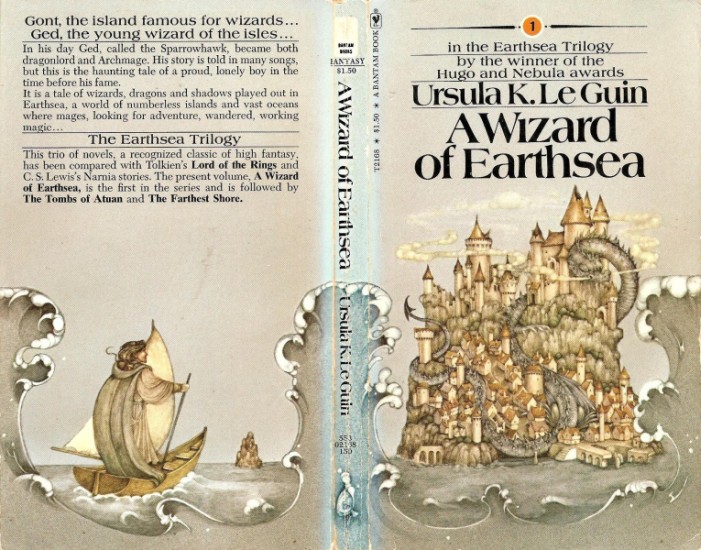
Readers interested in the Haldeman should know that Worlds is first of a trilogy. IIRC, the second and third go increasingly off the rails. The latter part of the third is especially WTF.
The distinction between colleges and universities is usually missing from common parlance in the US, but is quite significant to the institutions in question. Here in the state of Georgia, the state University System has conferred University status on a double handful of former colleges over the last 30 years. We also distinguish junior colleges (two years only), technical colleges (whose diplomas are usually professional certifications rather than baccalaureate), and community colleges (usually non-residential, catering in large part to part-time students and others who have spent time working post-high school.)
Another previously mentioned work is Robertson Davies’ High Spirits, a collection of comic ghost stories. The first features the shade of a dead grad student who, having forgotten which faculty he belonged to, has prepared thesis defences for _all_ of them.
5: As I recall, the final volume of Worlds incorporated Haldeman’s Tricentennial. The Haldeman was written to fit the details of a Rick Sternbach cover for the July 1976 Analog.
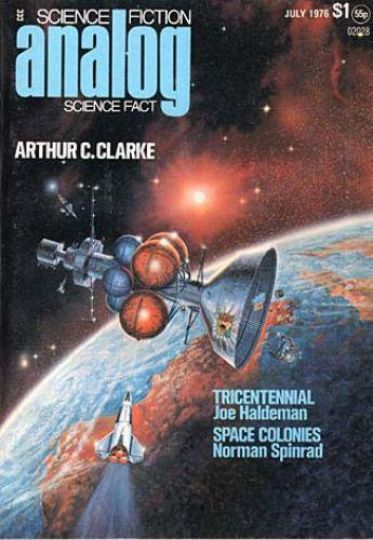
Perhaps these aren’t directly in the vein, but what the hey.
Rachel Caine’s The Great Library series – Only a handful of promising applicants join the Great Library each year, in a world where books are disallowed unless handwritten by the Library itself, with a stamp that erases the book at their discretion. Johann Gutenburg was … removed for his heresy of “publication.”
Brandon Sanderson’s The Rithmatist – Students learn to battle each other with chalk drawings. Um, let’s try again – Ed Elric and Alphonse from Full Metal Alchemist practice drawing circles on the ground and send Zerg rushes at each other to battle for dominance, because Nebraska has a hole in reality that lets scribble monsters through. Oh, except the lead can’t make scribbles come to life.
Parts of Asimov’s Foundation series are set at the University on Trantor.
MCA Hogarth’s Dreamhealers series starts with Mindtouch, wherein the two main characters (of different species) are roommates at Seersana University. Both are xenopsychology students, attending class, picking a career path, volunteering together with children at the hospital affiliated with the university, and gradually developing a deep esper connection. The second book in the series has them dealing with internships and graduating.
“His Dark Materials” centres around Oxford University in two different worlds (and I’d give a lot to know who had to do what to a producer of the TV series for St Peter’s College to be so prominently featured in our world, because it’s not one of the famous ones or one of the pretty ones).
Connie Willis’ “To Say Nothing of the Dog” has one of the main characters as an 1888 Oxford student (who is in complete violation of University regulations for most of the book), one as an 1888 Oxford professor, and two as 21st century Oxford graduate students. And is centred around possibly the worst act of vandalism against Oxford architecture since the building of St Catherine’s College.
A lot of Asimov’s 1950s work (like “The Dead Past”) show he’s getting very disillusioned with academia.
R F Kuang’s Babel is also set mostly at Oxford.
Babel is on Mount Tsundoku, and would be higher if I wasn’t having a lot of trouble getting through longer works.
@@.-@: The school of magic on Roke seems to be the only such school in its world, so “college-level” may be the wrong question. Ged’s previous education was private tutoring/apprenticeship, and that at least is unremarkable about his background.
Fredric Brown’s story “Paradox Lost” is set in a university classroom… mostly. And features a prof who’s hitting on one of the students. IIRC, both of my grad supervisors were married to former students of theirs.
Whoever drew that cover for Compleat Werewolf doesn’t seem to have paid a lot of attention to how fangs work.
There has been no mention of the best Uni setting of them all. Terry Pratchett’s Unseen University.
Unseen Academicals
Sourcery
Equal Rites
Loved the James Alan Gardiner books. I am saddened that it looks like we won’t be getting the other two in what was clearly meant to be a four-volume series.
Caroline Stevermer’s College of Magics and Scholar of Magics are both set in academia — the first only for women set in an alternative France, the second only for men set in an alternative England.
Haldeman also has a book called There is No Darkness about a group of students on board what is essentially an interstellar “school afloat.” The novel consists of three, linked, shorter works that are set on different planets, one of which is Earth.
Too many to count in this category. The Magicians by Grossman; early Vorkosigan when Miles is at the Academy; and Novik’s very new Scholomance books, starting with A Deadly Education – or at least most of them.
Two from the past: Conjure Wife by Fritz Leiber, and The Sinister Researches of C.P. Ransom by H. Nearing, Jr.
Alfred Bester’s “The Men Who Murdered Mohammed” and “Oddy and Id” certainly qualify.
The protagonist? (at least a major character) of John M. Ford’s The Scholars of Night is a university professor but IIRC only is actually at the school in the very early part of the book. And I suppose it’s only SFF by association. In his Princes of the Air the protagonist (for sure this time) is a university student in the first (reasonably long) section of the book.
@1 happened at my high school too. It was pretty obvious *something* was going on between a female senior band member and the band director/music teacher. wow, could she make him blush. He’d become director directly after graduating from the local university so was only 6 or 7 years older than she was. This was back in the mid-80s. They did get married.
A fair part of Ellen Kushner and Delia Sherman’s Fall of the Kings takes place in the University at Riverside.
@22 — I only just finished reading Conjure Wife a couple days ago and quite enjoyed it.
@21 – IIRC we never see Miles at the academy for more than the one scene at the end of The Warrior’s Apprentice and the two at the start of The Vor Game (which are getting his first posting and then complaining about it).
@@.-@ @15 I can’t find a cite, but ISTR Le Guin saying that she’d based the atmosphere at Roke on Harvard.
26: Complaining about new jobs is a core element in the traditions of UWaterloo’s co-op program (in which undergrads get hired out during their undergrad careers so they can get practical experience with their academic education). It occurs to me UW’s co-op could very easily be used in an urban fantasy or SF series and yet offhand I don’t remember any novelist doing this.
Sharon Lee’s and Steve Miller’s Liaden Universe series has a few stories that take place at least partially at a university: Crystal Dragon, Local Custom, and Fledgling.
Caroline Stevermer’s A College of Magics and A Scholar of Magics
Leigh Bardugo’s Ninth House takes place at Yale– specifically, among the “secret societies” of Yale, which doubtless would be much more interesting if they featured actual magic along with the money and the networking.
@28 There are schools in the US that have similar programs, e.g. Northeastern University and the Rochester Institute of Technology. I do not recall seeing any of those used in SFF either but I don’t read a lot of urban fantasy (the most likely subgenre for this, I think).
It seems to me like a giant oversight. UW students get five or six work terms before graduation: that’s a decent length series.
Hal Clement’s Still River has five students from various interstellar species, candidates for the Respected Opinion degree at the institution called by the Human name of Golden Fleece University, finding their lives in danger when they are sent to the planet Enigma to study its puzzling atmosphere.
I just realised no-one’s mentioned The Kingkiller Chronicle yet. So, The Kingkiller Chronicle.
Since @2 took the first book to leap to mind, I’ll mention that Middlegame has a section set in a university and Matt Ruff’s debut novel Fool on the Hill takes place almost entirely at Cornell.
Robertson Davies’ Cornish Trilogy spends a lot of time in academia. No actual magic, but a lot of strange coincidences. Like Dickens, he is not afraid to make characters larger than life & nearly as improbable.
I’m hoping to tackle the Cornish trilogy next year.
As a co-op grad, a series of magical university co-op stories would be amazing.
While it’s not set in academia, I will give bonus points to Victoria Goddard’s Greenwing and Dart series, which is the only example I’ve come across of someone saving the day with their senior thesis (while thoroughly vindicating their work). It shouldn’t come as a surprise that the author has a PhD.
As an aside – in Canada, university is used for four year degree granting institutes, and college for usually two year institutes which offer professional training and more vocationally oriented programs, as well as some university transfer courses. The term college for a sub-division of a university comes from the British system, where students are attached to a college within the university. The University of Toronto, one of the older institutions in Canada, has a college system.
@3 beat me to Tam Lin–but I will add Pauline Ashwell’s Unwillingly to Earth. Young woman with an Educational Handicap from a mining planet becomes a student of Cultural Engineering at Russett Interplanetary College of Humanities, Earth.
Davies’ “The Ghost Who Vanished by Degrees” is my favorite ghost story of all time. But then, I don’t go for horror. I prefer my ghost stories humorous.
“College” and “university” have different technical meanings in the US, but the everyday phrases are “I’m going to college”; “What college do you go to?”; “She’s in college”; “He’s a college student”; etc. whether the institution in any particular instance is technically a college or a university. The only person I’ve heard say “I’m going to university” was Canadian.
The vast majority of Mercedes Lackey’s Valdemar books take place in and around the Collegium.
Also by Le Guin, the university chapters of The Dispossessed are among the best representations of academia and academic politics anywhere.
The framing device for the Harold Shea Compleat Enchanter stories is a couple of Psychology professors discovering a way to travel between “fictional” worlds using symbol manipulation/meditation/handwaving.
There’s also a sub plot grad student who becomes the love interest of the younger professor that even when I read the book in the ’80s made me feel rather queasy.
THAT WAS AWESOME! WRITERS ON WRITING
A Sinister Reality: Elizabeth Hand’s Waking the Moon
Julia Keller
Thu Nov 30, 2017 2:00pm 11 comments 4 Favorites [+]
has a lot in common with some of the books mentioned above that seem to have had a more lasting popularity.
A Personal Demon by David Bischoff, Rich Brown, and Linda Richardson (1985) is a collection of short stories originally published in Fantastic, edited by Ted White, back in the 70s.
The protagonist, Willis Baxter, is a medievalist professor who in the first story drunkenly conjures up the eponymous demon, having only intended to perform a party trick; he succeeds because Anathae* (the she-demon who answers the call) had never before been summoned (and banished).
*(She’s several thousand years old but appears as an incredibly nubile young woman.)
The setting is that of a fictional Powhatan University, complete with the vicious backbiting and rivalries among faculty members in the literature department where Baxter is a professor that some think of as typical for academe.
Tracy Deonn’s Legendborn takes place at UNC-Chapel Hill, combining high school and college/university students.
Joan Slonczewski’s The highest frontier takes place on a university campus that happens to orbit earth.
The protagonist and sidekick in Bimbos of the Death Sun are professors at Virginia Tech investigating a murder at a con
What is it with iPads and Tor that I keep double posting?
Although the association with academia is rather brief, Heinlein’s “The Number of the Beast” begins at a university dance that provides the setting for the introduction of the main characters. This is where I was introduced to the definition of “PhD”. “Piled higher and deeper”. The late Dean of science fiction could always get a laugh out of me.
One of the story lines in Learning the World by Ken MacLeod is set in alien academia – the protagonist is their “version” of Persival Lowell/Clyde Tombaugh.
Robert Sawer has quite a few “acedemic” S: Calculating God, FlashForward, The Terminal Experiment, Quantum Night, the Neanderthal trilogy. I would also count the Quantaglio triligy, although the setting more resembles Earth’s medieval academia.
Last but not least, the ex-communist SF (Bulgarian, Soviet, Polish, etc.) had a special sub-genre about near-future scientific discoveries. Often these were cross-overs with spy novels – there was always a Western spy trying to sabotage/steal the new discovery. To give you an idea – there was a Bulgarian SF novel from 1950s about a biologist that developed giant caws that produced much more meat and milk than the regular ones. And there was a spy that got infected by the gigantifying medicine… Before you laugh, these books served two purposes – they were political propaganda, of course, but also they were popularizing science – back in that time the country was mainly agricultural, so this second goal had certain merit.
A fun sub-genre…
The later _Missy the Werecat_ books take place at West Point (the US Army’s Academy), and the school environment is a big part of the story. I think the last one’s set at Annapolis (the US Naval Academy), but I haven’t gotten that far yet.
@0 Sarah Kuhn’s Haunted Heroine is the fourth book in the Heroine Complex series and I think if you start there you will miss a lot of backstory. The series as a whole is fun take on superheroes in general.
In America, traditionally Universities offer graduate degrees, Colleges offer four year undergraduate degrees, and Community Colleges offer two year certificates.
I’ll toss in Luna Nova from Little Witch Academia. Due to magic practitioners being a conservative lot, magic is decreasing in the world and Luna Nova is bearing the brunt of it, and with reluctance, opened it doors to promising witches from around the world… and Atsuko Kagari… A “learning impaired” would-be witch.
Neil Stephenson’s “Anathem” should qualify, where the monasteries (or equivalents, I should say) belong to academia.
More than one of H.P. Lovecraft’s yarns takes place, at least in part, at Miskatonic University (go PODS).
Memory escapes me; was it ever shown that Terry Pratchett’s Unseen University actually had any students?
@56: Terry Pratchett’s Unseen University has The Librarian. Everything else is irrelevant. ;)
UU does have students and Equal Rites discusses them from admission through graduation. But after that they are just referenced and none are named (save for the professors who reminisce about their student days).
In thinking about the topic, Patrick Rothfuss and the Kingkiller Chronicles comes to mind. In the early books it’s a student’s memory of life in a magical college, from admission to dorms to classes to exams to professors to tuition.
@@@@@ 58 – “But after that they are just referenced and none are named”
Nope. Not only do we first meet Ponder as a student, along with Victor, but we encounter several of Ponder’s (named) students in the High Energy Magic building.
Diana Wynne Jones “Year of the Griffin” takes place at a magical university with some quite pompous professors. The students learn despite their teaching. It’s a sequel to Dark Lord of Derkholm but can be read as a standalone.
@20 There is No Darkness is by Joe and Jack C. Haldeman and was actually the first book I thought about when I saw the topic.
Dirk Gently’s Holistic Detective Agency happens mostly at “St. Ced’s” college in Oxford iirc, and the Dude With Time Machine has been on the faculty for a pretty long time…
@62 – “St Cedd’s” is a Cambridge college (also appears in a Doctor Who serial Adams wrote). Adams went to the Pale Imitation, not the Dark Side.
@32. The Bombshelter circa 1990’s would be a great place for a scene.
@50 I think Robert Sawyer has some scenes at the UofW adjacent Perimeter Institute.
It’s only associational, I suppose, but I can’t not mention Umberto Eco’s Name of the Rose.
Substantial parts of The Three-Body Problem take place at Tsinghua University.
One that hasn’t been mentioned yet (I think) is Vita Nostra by Sergey and Marina Dyachenko: set at one of the more terrifying magic colleges I’ve yet to read about (and a wonderfully metaphysical take on how strange and incomprehensible the first year at university can be!)
Carol Ann Crispin’s StarBridge series
Jody Lynn Nye’s Mythology series, starting with “Mythology 101”, is a great read.
Naomi Novik’s Scholomance Trilogy… my latest obsession. What if magic-wielders were sent to boarding school in the void because magical creatures wanted to eat them, and the Scholomance’s 25% survival rate was the safer alternative to adolescence in the real world? And what if you were an insanely powerful dark sorceress with a talent for killing that you never got to test because you were raised by the crunchiest earth mother magician ever, in a Welsh yurt? LOVE LOVE LOVE
Pohl and Williamson wrote The Undersea Trilogy in the 1950s about young cadets attending the Sub-Sea Academy, full of domed underwater cities, submarines, and hijinks with sea serpents and sea quakes, reminiscent of Twenty Thousand Leagues Under the Sea. From what I remember, the cadets rarely made it to class as they were frequently haring off on one adventure or another.
I was taught the colleges granted BA degrees at the most and universities granted advanced degrees. But there are many colleges that grant masters and doctoral degrees.
The Scholomance series by Naomi Novik is set entirely at a school of magic that is actively trying to kill Its students. Anyone who survives graduates.
The Binti series by Nnedi Okorafor. Binti is an African math prodigy who leaves Earth to study at Oomza university, the best university in the galaxy. Lots of aliens, and she saves the universe.
The antagonists of V.E. Schwab’s Vicious start as college roommates…
Simak’s The Goblin Reservation (1968), in which the entire Earth has been made into one big university.
Ruthanna Emrys, Winter Tide, largely set at or around Miskatonic University, which is unknowingly host to a very distinguished visiting professor.
The Steerswoman books don’t really have a university but Rowan is basically an academic-at-large.
Some of the Kencyr books visit Mount Alban, the college of scrollsmen and singers. If we accept military college, there are three whole books set at Tentir.
St. Mary’s (Jodi Taylor) is theoretically an academic setting but is actually a bit of a mess. Of course, that doesn’t really make it that much different than other academic settings save for investigating the dinosaur fights, finding out Jack the Ripper was *different* even for a mass murderer, and other fun things.
The early part of Pratchett’s Pyramids was set in the Assassin’s Academy.
That Hideous Strength by C.S.Lewis. A lot of unpleasant academics meet sticky ends with the assistance of Merlin.
Robert Heinlein’s Tunnel in the Sky is about taking one’s final exam on an uninhabited planet. If you survived, you graduated.
Does Name of the Wind or Ender’s game count? lol
I am a little late with this, but the prolific L.E. Modesitt has the Ghost trilogy, beginning with Ghost of the Revelator, a professor of politics with a professional singer spouse in an alternate America with more Dutch roots.
@71 – I have to say, it’s pretty entertaining to have a lawful good dark sorceress.